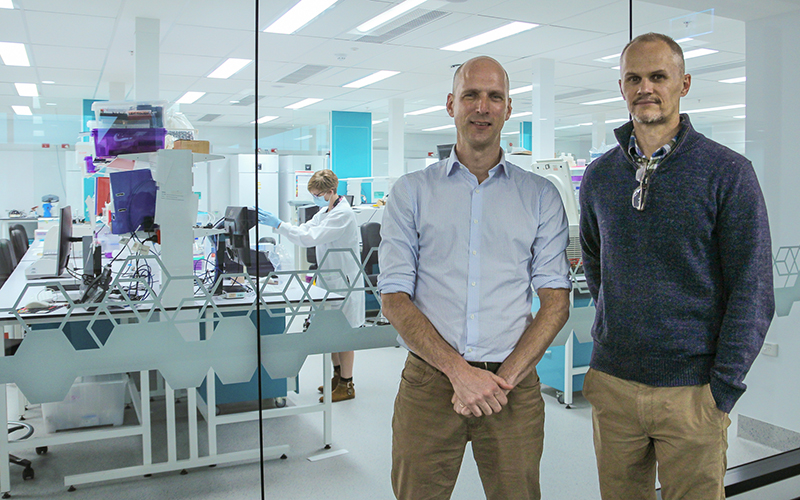Search
Research
Delivery at 37 weeks' gestation is associated with a higher risk for child behavioural problemsWe suggest that 37 weeks' gestation may not be the optimal cutoff for defining perinatal risk as it applies to behavioural development.
Research
Persistent Effects of Maternal Smoking during Pregnancy on Lung Function and Asthma in AdolescentsThe extent to which maternal smoking in pregnancy (MSP) has persisting effects on respiratory health remains uncertain and the mechanisms involved are not...
Research
Umbilical Cord Blood Testosterone and Childhood Internalizing and Externalizing Behavior: A Prospective StudyAntenatal testosterone exposure influences fetal neurodevelopment and gender-role behavior in postnatal life and may contribute to differences in...
Research
High prevalence of undiagnosed obstructive sleep apnoea in the general population and methods for screening for representative controlsUndiagnosed obstructive sleep apnoea (OSA) in the community makes comparisons of OSA subjects with control samples from the general population problematic.
Research
Androgen concentrations in umbilical cord blood and their association with maternal, fetal and obstetric factorsThe aim of this study was to measure umbilical blood androgen concentrations in a birth cohort using a highly specific liquid chromatography-tandem mass...
Research
Can linked emergency department data help assess the out-of-hospital burden of acute lower respiratory infectionsThere is a lack of data on the out-of-hospital burden of acute lower respiratory infections (ALRI) in developed countries.
Research
Sex-specific associations between umbilical cord blood testosterone levels and language delay in early childhoodPreliminary evidence suggests that prenatal testosterone exposure may be associated with language delay.
Research
Emergency department overcrowding, mortality and the 4-hour rule in Western AustraliaThe objective of this study was to assess whether emergency department (ED) overcrowding was reduced after the introduction of the 4-hour rule in WA hospitals.
Research
Parental prenatal smoking and risk of childhood Acute Lymphoblastic LeukemiaThe association between parental smoking and risk of childhood acute lymphoblastic leukemia (ALL) was investigated in an Australian population-based...
Research
Pandemic influenza H1N1 2009 infection in Victoria, AustraliaConflicting findings regarding the level of protection offered by seasonal influenza vaccination against pandemic influenza H1N1 have been reported.
Research
Inflammation induces α1-adrenoceptor expression in peripheral blood mononuclear cells of patients with complex regional pain syndromePersistent regional and systemic inflammation may promote pain and hyperalgesia in complex regional pain syndrome. In this study, we investigated whether stimulation of α1-adrenoceptors on peripheral blood mononuclear cells might contribute to this inflammatory state.
Research
Down syndrome and leukemia: from basic mechanisms to clinical advancesChildren with Down syndrome (DS, trisomy 21) are at a significantly higher risk of developing acute leukemia compared to the overall population. Many studies investigating the link between trisomy 21 and leukemia initiation and progression have been conducted over the last two decades.
Research
Celebrating 100 years of Immunology & Cell Biology – a special focus on the field of tumor immunology in AustraliaIn this Commentary article, as part of the 100-year celebrations of the journal, we reflect on the contribution of articles published in ICB in the field of tumor immunology. A highlight is a series of interviews conducted with three Australian-based ICB authors who have contributed key papers over the years: Rajiv Khanna, Delia Nelson and Ian Frazer.
Research
Improving compliance with swallowing exercise to decrease radiotherapy-related dysphagia in patients with head and neck cancerDysphagia, one of the most common complications in head and neck cancer (HNC) treated with radiotherapy, can severely affect patients’ quality of life. Currently, because no “gold standard” treatment exists, swallowing exercise remains the main rehabilitation strategy for dysphagia. However, patients’ compliance with long-term swallowing exercise is only 40%, thus, greatly compromising outcomes. This article aims to analyze thefactors influencing swallowing exercise compliance in patients with HNC and explains strategies developed to date for improved rehabilitation outcomes.
Research
Comprehensive Testing of Chemotherapy and Immune Checkpoint Blockade in Preclinical Cancer Models Identifies Additive CombinationsAntibodies that target immune checkpoints such as cytotoxic T lymphocyte antigen 4 (CTLA‐4) and the programmed cell death protein 1/ligand 1 (PD-1/PD-L1) are now a treatment option for multiple cancer types. However, as a monotherapy, objective responses only occur in a minority of patients. Chemotherapy is widely used in combination with immune checkpoint blockade (ICB). Although a variety of isolated immunostimulatory effects have been reported for several classes of chemotherapeutics, it is unclear which chemotherapeutics provide the most benefit when combined with ICB.
Research
Retinoic Acid Induces an IFN-Driven Inflammatory Tumour Microenvironment, Sensitizing to Immune Checkpoint TherapyWith immune checkpoint therapy (ICT) having reshaped the treatment of many cancers, the next frontier is to identify and develop novel combination therapies to improve efficacy. Previously, we and others identified beneficial immunological effects of the vitamin A derivative tretinoin on anti-tumour immunity.
Research
A surveillance clinic for children and adolescents with, or at risk of, hereditary cancer predisposition syndromesHereditary cancer predisposition syndromes (HCPS) account for at least 10% of paediatric cancers.1 Li‐Fraumeni syndrome (LFS) is a dominant HCPS caused by mutations in the TP53 gene and is associated with an 80–90% lifetime risk of cancer, commencing in infancy.2 Children of affected individuals are at 50% risk of inheriting the family mutation.
Research
Whole genome, transcriptome and methylome profiling enhances actionable target discovery in high-risk pediatric cancerThe Zero Childhood Cancer Program is a precision medicine program to benefit children with poor-outcome, rare, relapsed or refractory cancer. Using tumor and germline whole genome sequencing (WGS) and RNA sequencing (RNAseq) across 252 tumors from high-risk pediatric patients with cancer, we identified 968 reportable molecular aberrations.

News & Events
Cancer immunotherapy in a tablet a step closer thanks to CUREator grantResearchers at The Kids Research Institute Australia and UWA will use a $500,000 CUREator grant to progress the development of the first cancer immunotherapy in a tablet.
